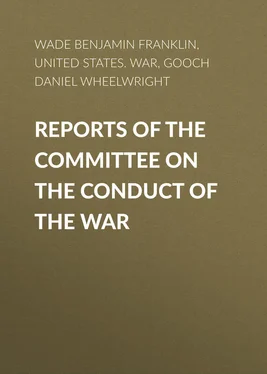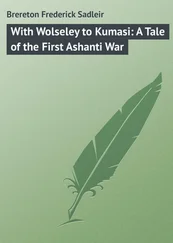Benjamin Wade - Reports of the Committee on the Conduct of the War
Здесь есть возможность читать онлайн «Benjamin Wade - Reports of the Committee on the Conduct of the War» — ознакомительный отрывок электронной книги совершенно бесплатно, а после прочтения отрывка купить полную версию. В некоторых случаях можно слушать аудио, скачать через торрент в формате fb2 и присутствует краткое содержание. Жанр: История, foreign_antique, foreign_prose, на английском языке. Описание произведения, (предисловие) а так же отзывы посетителей доступны на портале библиотеки ЛибКат.
- Название:Reports of the Committee on the Conduct of the War
- Автор:
- Жанр:
- Год:неизвестен
- ISBN:нет данных
- Рейтинг книги:3 / 5. Голосов: 1
-
Избранное:Добавить в избранное
- Отзывы:
-
Ваша оценка:
- 60
- 1
- 2
- 3
- 4
- 5
Reports of the Committee on the Conduct of the War: краткое содержание, описание и аннотация
Предлагаем к чтению аннотацию, описание, краткое содержание или предисловие (зависит от того, что написал сам автор книги «Reports of the Committee on the Conduct of the War»). Если вы не нашли необходимую информацию о книге — напишите в комментариях, мы постараемся отыскать её.
Reports of the Committee on the Conduct of the War — читать онлайн ознакомительный отрывок
Ниже представлен текст книги, разбитый по страницам. Система сохранения места последней прочитанной страницы, позволяет с удобством читать онлайн бесплатно книгу «Reports of the Committee on the Conduct of the War», без необходимости каждый раз заново искать на чём Вы остановились. Поставьте закладку, и сможете в любой момент перейти на страницу, на которой закончили чтение.
Интервал:
Закладка:
Major Williams, (colored,) private, company B, 6th United States heavy artillery, sworn and examined.
By the chairman:
Question. Where were you raised?
Answer. In Tennessee and North Mississippi.
Question. Where did you enlist?
Answer. In Memphis.
Question. Who was your captain?
Answer. Captain Lamburg.
Question. Were you in the fight at Fort Pillow?
Answer. Yes, sir.
Question. Was your captain with you?
Answer. No, sir; I think he was in Memphis.
Question. Who commanded your company?
Answer. Lieutenant Hunter and Sergeant Fox were all the officers we had.
Question. What did you see done there?
Answer. We fought them right hard during the battle, and killed some of them. After a time they sent in a flag of truce. They said afterwards that they did it to make us stop firing until their re-enforcements could come up. They said that they never could have got in if they had not done that; that we had whipped them; that they had never seen such a fight.
Question. Did you see the flag of truce?
Answer. Yes, sir.
Question. What did they do when the flag of truce was in?
Answer. They kept coming up nearer and nearer, so that they could charge quick. A heap of them came up after we stopped firing.
Question. When did you surrender?
Answer. I did not surrender until they all run.
Question. Were you wounded then?
Answer. Yes, sir; after the surrender.
Question. At what time of day was that?
Answer. They told me it was about half after one o'clock. I was wounded immediately we retreated.
Question. Did you have any arms in your hands when they shot you?
Answer. No, sir; I was an artillery man, and had no arms.
Question. Did you see the man who shot you?
Answer. No, sir.
Question. Did you hear him say anything?
Answer. No, sir; I heard nothing. He shot me, and it was bleeding pretty free, and I thought to myself, "I will make out it was a dead shot, and may be I will not get another."
Question. Did you see any others shot?
Answer. No, sir.
Question. Was there anything said about giving quarter?
Answer. Major Bradford brought in a black flag, which meant no quarter. I heard some of the rebel officers say: "You damned rascals, if you had not fought us so hard, but had stopped when we sent in a flag of truce, we would not have done anything to you." I heard one of the officers say: "Kill all the niggers;" another one said: "No; Forrest says take them and carry them with him to wait upon him and cook for him, and put them in jail and send them to their masters." Still they kept on shooting. They shot at me after that, but did not hit me; a rebel officer shot at me. He took aim at my side; at the crack of his pistol I fell. He went on and said: "There's another dead nigger."
Question. Was there any one shot in the hospital that day?
Answer. Not that I know of. I think they all came away and made a raft and floated across the mouth of the creek, and got into a flat bottom.
Question. Did you see any buildings burned?
Answer. I staid in the woods all day Wednesday. I was there Thursday and looked at the buildings. I saw a great deal left that they did not have a chance to burn up. I saw a white man burned up who was nailed up against the house.
Question. A private or an officer?
Answer. An officer; I think it was a lieutenant in the Tennessee cavalry.
Question. How was he nailed?
Answer. Through his hands and feet right against the house.
Question. Was his body burned?
Answer. Yes, sir; burned all over – I looked at him good.
Question. When did you see that?
Answer. On the Thursday after the battle.
Question. Where was the man?
Answer. Right in front of the fort.
Question. Did any one else that you know see the body nailed up there?
Answer. There was a black man there who came up on the same boat I was on.
Question. Was he with you then?
Answer. Yes, sir; and there were some five or six white people there, too, from out in the country, who were walking over the place.
Alexander Nayron, (colored,) private, company C, 6th United States heavy artillery, sworn and examined.
By Mr. Gooch:
Question. Where were you raised?
Answer. In Mississippi.
Question. Have you been a slave?
Answer. Yes, sir.
Question. Where did you enlist?
Answer. At Lagrange, last August.
Question. Were you at Fort Pillow at the time of the attack?
Answer. Yes, sir.
Question. When were you wounded?
Answer. After the fight.
Question. About what time?
Answer. About three o'clock, I reckon.
Question. Where were you when you were wounded?
Answer. Down at the river, lying down by the side of a log. They came there and told me to get up, and as I got up they shot me.
Question. Who shot you, an officer or private?
Answer. A private.
Question. How many times were you shot?
Answer. But once; they shot me in my head, and thought they had killed me.
Question. Did you see any others shot there?
Answer. Yes, sir; several other black men with me.
Question. Did you see any small boys shot?
Answer. No, sir.
Question. Did you go back from the river after you were shot?
Answer. No, sir.
Question. You remained there until you were brought away by the gunboat?
Answer. Yes, sir. I saw several of our boys shot while they were fighting. They said, when they shot me, that they were allowed to kill every damned nigger in the fort – not spare one.
Question. You saw nobody buried or burned?
Answer. No, sir; I saw them throw several in the water.
Question. Were they all dead that were thrown in?
Answer. Yes, sir; about dead.
Eli Carlton, (colored,) private, company B, 6th United States heavy artillery, sworn and examined.
By the chairman:
Question. Where were you raised?
Answer. In East Tennessee.
Question. Have you been a slave?
Answer. Yes, sir.
Question. Who was your master?
Answer. Major Fleming. I was sold once; I have had two masters.
Question. Where did you join the army?
Answer. At Corinth, Mississippi, about a year ago.
Question. Were you at Fort Pillow at the time it was taken?
Answer. Yes, sir.
Question. State what happened there.
Answer. I saw 23 men shot after they surrendered; I made 24; 17 of them laid right around me dead, and 6 below me.
Question. Who shot them?
Answer. The rebels; some white men were killed.
Question. How many white men were killed?
Answer. Three or four.
Question. Killed by the privates?
Answer. Yes, sir; I did not see any officers kill any.
Question. Were the white men officers or privates?
Answer. Privates.
Question. Were the men who shot you near to you?
Answer. Yes, sir; ten or fifteen steps off.
Question. Were you shot with a musket or a pistol?
Answer. With a musket. I was shot once on the battle-field before we surrendered. They took me down to a little hospital under the hill. I was in the hospital when they shot me a second time. Some of our privates commenced talking. They said, "Do you fight with these God damned niggers?" they said, "Yes." Then they said, "God damn you, then, we will shoot you," and they shot one of them right down. They said, "I would not kill you, but, God damn you, you fight with these damned niggers, and we will kill you;" and they blew his brains out of his head. They then went around and counted them up; I laid there and made 18 who were there, and there were 6 more below me. I saw them stick a bayonet in the small part of the belly of one of our boys, and break it right off – he had one shot then.
Question. Did you see any of our men shot the next day?
Читать дальшеИнтервал:
Закладка:
Похожие книги на «Reports of the Committee on the Conduct of the War»
Представляем Вашему вниманию похожие книги на «Reports of the Committee on the Conduct of the War» списком для выбора. Мы отобрали схожую по названию и смыслу литературу в надежде предоставить читателям больше вариантов отыскать новые, интересные, ещё непрочитанные произведения.
Обсуждение, отзывы о книге «Reports of the Committee on the Conduct of the War» и просто собственные мнения читателей. Оставьте ваши комментарии, напишите, что Вы думаете о произведении, его смысле или главных героях. Укажите что конкретно понравилось, а что нет, и почему Вы так считаете.












